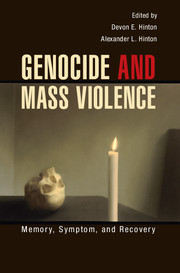Book contents
- Frontmatter
- Contents
- List of Figures
- List of Tables
- List of Contributors
- Foreword: What Does Trauma Do?
- Acknowledgments
- Introduction An Anthropology of the Effects of Genocide and Mass Violence
- Part I Private and Public Memory
- Part II Symptom and Syndrome
- 7 “The Spirits Enter Me to Force Me to Be a Communist”
- 8 “Everything Here Is Temporary”
- 9 Key Idioms of Distress and PTSD among Rural Cambodians
- 10 Attack of the Grotesque
- Part III Response and Recovery
- Index
- References
8 - “Everything Here Is Temporary”
Psychological Distress and Suffering among Iraqi Refugees in Egypt
Published online by Cambridge University Press: 05 November 2014
- Frontmatter
- Contents
- List of Figures
- List of Tables
- List of Contributors
- Foreword: What Does Trauma Do?
- Acknowledgments
- Introduction An Anthropology of the Effects of Genocide and Mass Violence
- Part I Private and Public Memory
- Part II Symptom and Syndrome
- 7 “The Spirits Enter Me to Force Me to Be a Communist”
- 8 “Everything Here Is Temporary”
- 9 Key Idioms of Distress and PTSD among Rural Cambodians
- 10 Attack of the Grotesque
- Part III Response and Recovery
- Index
- References
Summary
Psychological problems ... begin from Iraq and continue where they (refugees) live now or where they settled in Egypt. It is concern about the war itself, second about the life, and the shortage of life facilities. Also about the unclear future; the future is an important thing to the person, to the human being. If the future is not clear, some problems will begin.
(Laith, NGO physician, Cairo, 2007)Living in Egypt has an effect on my health. Of course. Every day I wake up, I feel that I am older by ten years.... Every day, ten years. Because of the sadness and because I am scared. Maybe one day the Egyptian government will say that we cannot accept Iraqis and will make us go back. I cannot go back. I will kill myself before I go back. The media is saying that things are better in Iraq, but they are lying. Our families there, they tell us it is as bad.... So I am afraid of going back to Iraq, and I am afraid of staying here in Egypt. So I have no choices. We came here as a station. It is a temporary place. I can’t be excited for anything. I can’t be excited for tomorrow. If I want to buy anything I say no, maybe the money can help in another place. The future is unknown and we cannot decide anything. We are waiting for an unknown future. So we are very sad here. I can’t stay more in Egypt. I hate myself.
(May, Iraqi refugee woman, Cairo, 2008)- Type
- Chapter
- Information
- Genocide and Mass ViolenceMemory, Symptom, and Recovery, pp. 195 - 211Publisher: Cambridge University PressPrint publication year: 2014
References
- 2
- Cited by



